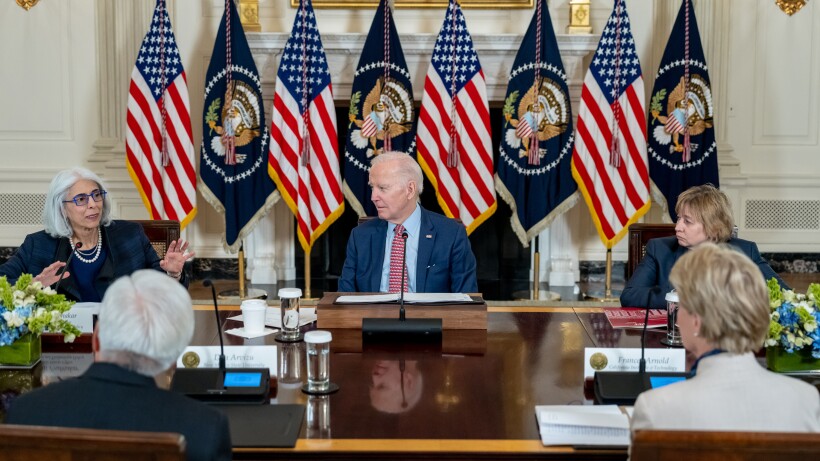Biden’s PCAST Offers Parting Ideas on S&T Opportunities

PCAST co-chairs Arati Prabhakar, left, Maria Zuber, right, and Frances Arnold, right foreground, at a meeting with President Biden in April 2023.
Adam Schultz/White House
The President’s Council of Advisors on Science and Technology issued a farewell letter
The letter recaps PCAST’s work during the Biden administration to provide recommendations across areas ranging from climate change impacts and public health to the state of the S&T enterprise. It points to the council’s recent reports on the value of social sciences
The council reflected on these ideas and more at its final meeting on Jan. 10,
“Any part of public service, as it ends, of course you want to look back, but I think it’s integral to the public role to also look forward,” PCAST co-chair Arati Prabhakar said at the meeting.
Accelerating scientific discovery
The letter highlights automation as a method of expediting scientific discovery, drawing on findings from PCAST’s April 2024 report
Automation using AI and robotics can free scientists from the manual drudgery of preparing reagents or creating and testing designs for new chemicals or proteins, said Microsoft chief scientific officer Eric Horvitz at the meeting.
Horvitz outlined emerging uses of AI in scientific research, such as identifying promising materials or medications for further study, selecting which experiments are most valuable for humans to pursue, and creating high-fidelity simulations of the real world as a proxy for lab experimentation to increase efficiency and lower costs.
“It’s important for scientists across disciplines to study and share these early successes, about the remarkable speed-ups enabled by AI and robotics — we’re talking about orders of magnitude in terms of getting to answers more quickly — and apply them across disciplines,” Horvitz said.
AI is also enabling larger-scale scientific projects that involve the public, said UCLA math professor Terence Tao. He described projects for monitoring complex ecosystems that combine traditional data collection by professional scientists with field reports from the public.
“In the past, these sort of publicly generated data sets would be too unstructured and too heterogeneous to actually collate and organize properly. But with modern AI tools and so forth, it becomes possible,” Tao said. “The citizen contributors are not just second-class contributors, but they often contribute their own innovative new ways to organize information.”
PCAST issued a letter to the president
Stephen Pacala, an ecology and environmental biology professor at Princeton University, spoke about the need to meet AI energy demands with non-emitting power sources, even while the U.S. struggles to build new power plants. Pacala advocated for permitting reform for facilities not connected to the electric grid to bring down costs for builders and energy buyers. In Tuesday’s letter, PCAST praised the Biden administration’s framework
Newer clean energy technologies are showing promise, including advanced geothermal and gas with carbon capture and storage, Pacala said. There are “real-term prospects” of bringing down the energy costs of advanced geothermal to be comparable to wind and solar, he added. Pacala also identified fusion energy and photochemical fuels as long-term options for clean energy and said fusion is “the appropriate domain for a large and ongoing federal presence.”
Looking further ahead
The council discussed potential moonshot efforts, which they defined as big, bold research planned by the government, such as the Manhattan Project and Biden’s Cancer Moonshot. Moonshots should galvanize the next generation of scientists and engineers and define success in ways that are easy to measure with visible impact, said Andrea Goldsmith, an electrical engineering professor at Princeton University. She pointed to reversing climate change, such as by achieving net zero emissions or bringing down the temperature of the Earth by 2050, as a possible example.
“You have to say, this is the area, and these are the institutions that are going to contribute,” Goldsmith said. “And that might be challenging politically, but if you’re not willing to pick, you cannot galvanize people and researchers around a moonshot area.”
In the letter, PCAST praises Biden’s R&D initiatives while lamenting the lack of support in Congress for some aspects of his agenda.
“Unfortunately, Congress did not support your budget request for research and development in recent appropriations. This means we are not sufficiently replenishing the ‘seed corn’ that fuels American well-being,” the letter states, adding that the Chinese government has increased R&D spending “by 10% this year alone.”


